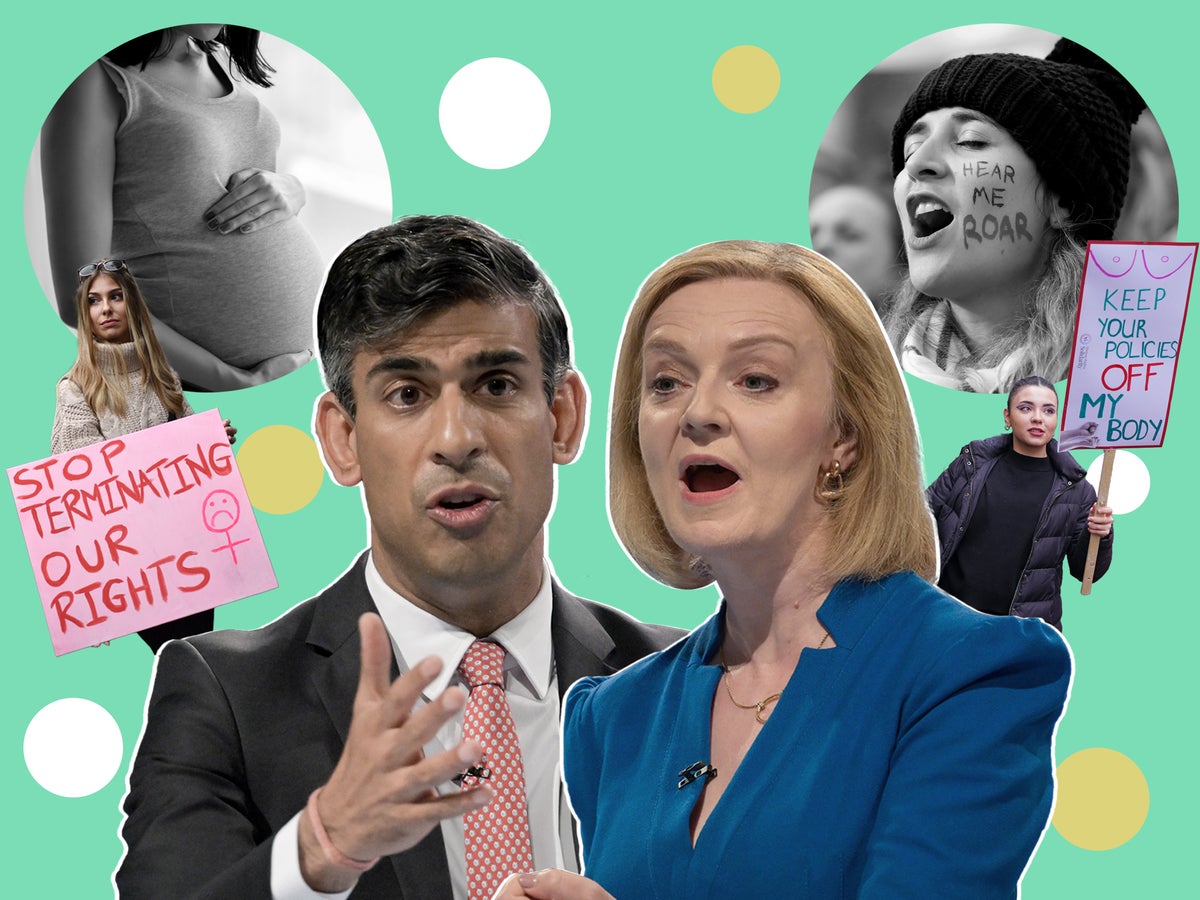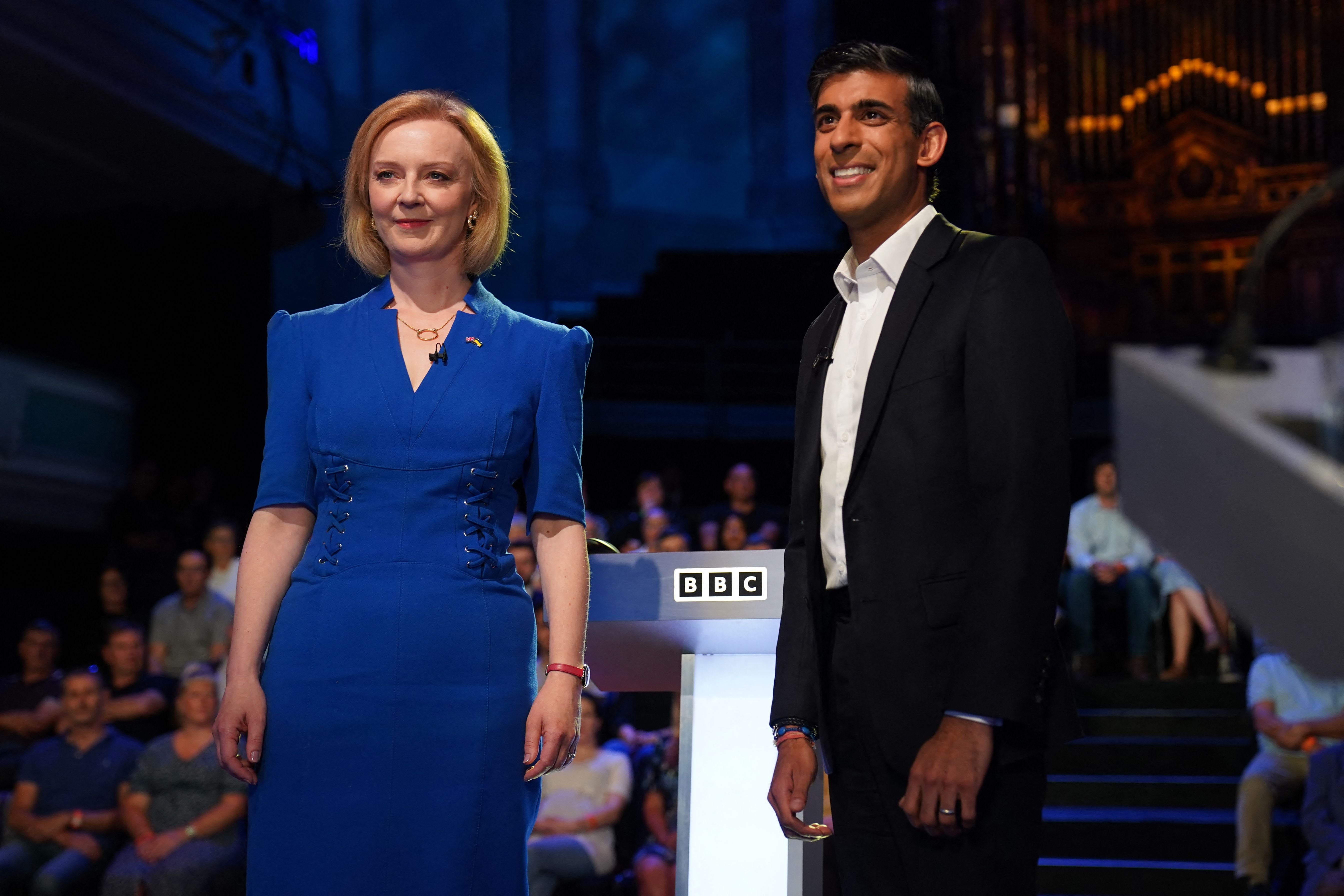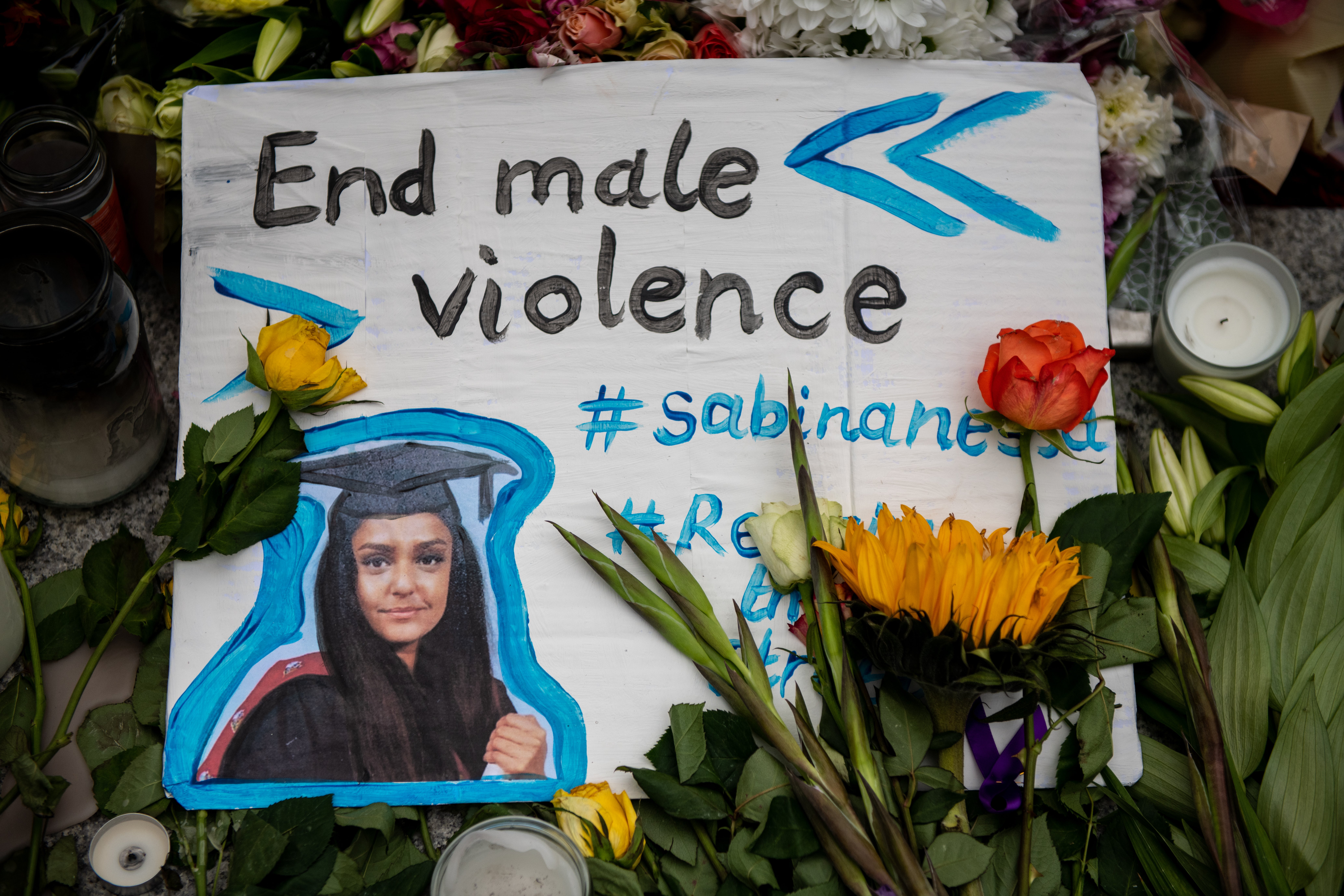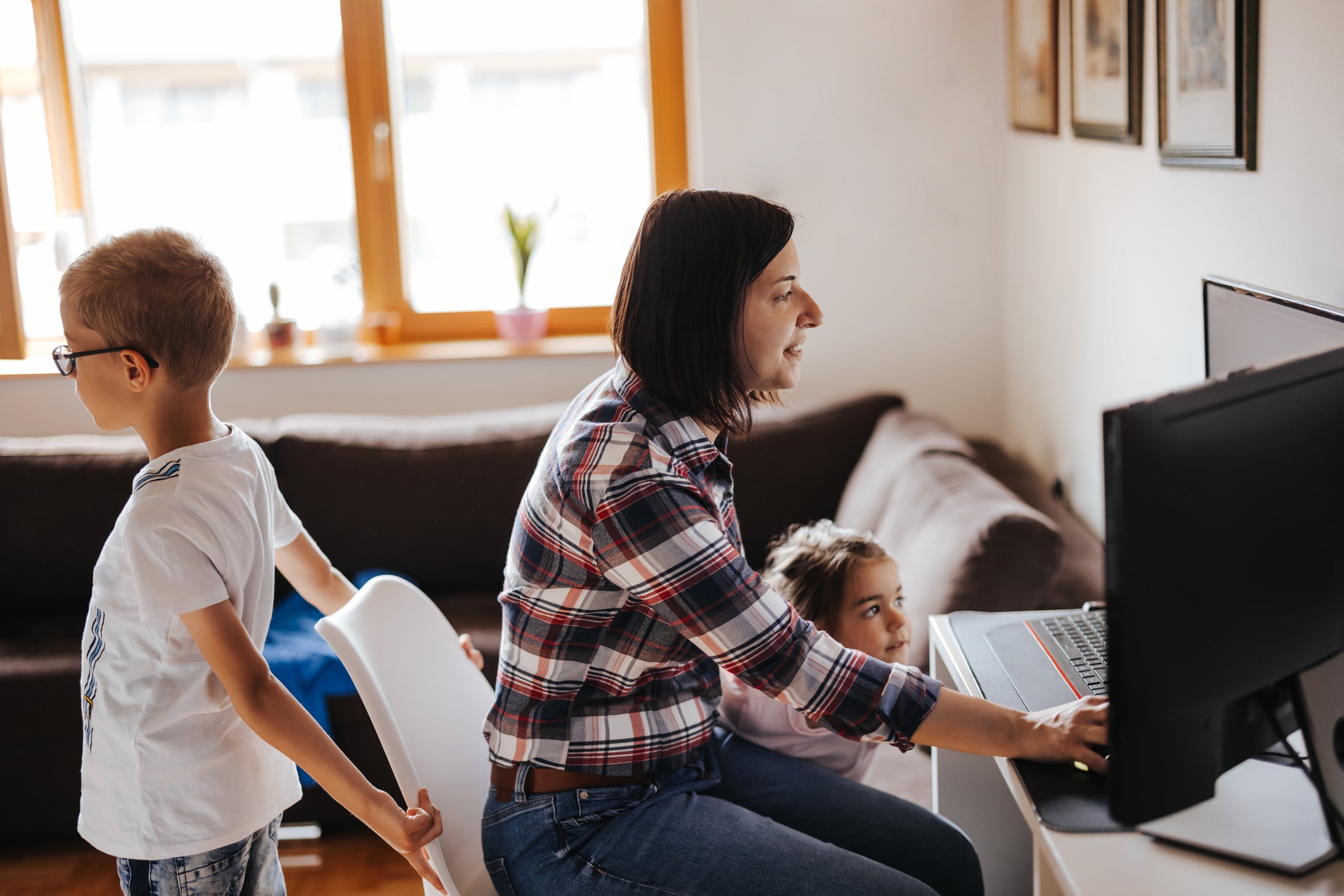
A leadership contest to name Boris Johnson’s successor as UK prime minister has been whittled down to ex-chancellor Rishi Sunak and foreign secretary Liz Truss.
A recent YouGov poll has found that 60 per cent of Conservative party members surveyed between 29 July and 2 August intend to vote for Ms Truss, putting her in the lead by 34 points.
Support for Mr Sunak has dipped, with just 26 per cent of the 1,043 members polled saying they would vote for him.
Both candidates have been busy pitching themselves to party members. Mr Sunak has promised to reduce personal taxes by 20 per cent before 2029, which he described as the “largest cut to income tax in 30 years”.
He has also pledged the introduction of no-show fines of £10 for people who “misuse” the NHS in a bid to help the health service recover from Covid-19 backlogs.
Meanwhile, Ms Truss has promised £30bn worth of tax cuts within weeks of taking office as a way of helping people through the cost-of-living crisis.
Ms Truss pledged to reverse the National Insurance increase (which came into effect in April).
“The tax cuts I’m talking about will be delivered on day one because we have an immediate issue that families are struggling with the cost of fuel, with the cost of food,” she said during a campaign visit to Devon.
“That’s why I will reverse the increase in National Insurance. I’ll also have a temporary moratorium on the green energy levy to cut fuel bills.”

Separately, she has placed her focus on reforming the education sector, including widening access to top institutions, like the universities of Oxford and Cambridge, and placing less importance on predicted grades.
Mr Sunak and Ms Truss have also made pledges to show they are prepared to act on violence against women and girls.
Mr Sunak has promised to criminalise down-blousing, while Ms Truss said she would work to create a National Domestic Abuse Register to tackle repeat offending by abusive men.
But as the pair go head-to-head for the vote of around 160,000 party members, where do they really stand on women’s issues? Here’s what we’ve learned so far.
On abortion rights
Neither Ms Truss nor Mr Sunak have strongly supported women’s reproductive rights during their political careers.
Rishi Sunak
Mr Sunak, who served as the chancellor throughout the pandemic before resigning from the position last month, has abstained from all major votes on abortion rights since becoming an MP in 2015.
Mr Sunak has cast just one pro-abortion vote – in April 2021, when he voted in favour of a motion to give the Northern Ireland secretary powers to impose the commissioning of abortion services in the country.
He failed to support bills on key abortion rights issues, such as a 2018 bill that would have introduced “buffer-zones” outside abortion clinics across the UK and abstained on the vote to continue the “pills by post” scheme introduced during the pandemic.
Liz Truss
Ms Truss cast her vote to decriminalise abortion in Northern Ireland, but also sat out votes on buffer-zones.
As minister for women and equalities, she has been criticised by the British Pregnancy Advisory Service (BPAS) for ignoring its demands to publicly denounce the US Supreme Court’s overturning of Roe v Wade in June.
Additionally, in 2019 she took an audience with Heritage Foundation, a conservative think tank that campaigns against abortion.
The BPAS said both Mr Sunak and Ms Truss have demonstrated a “pattern of abstention when it comes to the issue of abortion”.
“In 2022, in the wake of the US decision to overturn Roe V wade, the UK needs a leader who will openly and vocally support a woman’s right to access abortion,” it said in a statement to The Independent.
“Warms words from these leadership candidates about supporting women and girls amount to very little when they have both repeatedly failed to take part in a number of key votes to further reproductive choice and help protect women and girls.”
On violence against women
Rishi Sunak
Mr Sunak has proposed a new “down-blousing offence”. He has also pledged to create a new taskforce to crack down on grooming gangs.
He said a new National Crime Agency emergency taskforce would “hunt down” criminal gangs.
Mr Sunak described sexual violence against women and girls is a “national emergency”.
“As a father of two girls, I want them to be able to go for a walk in the evening or to a shop at night without any fear of threat,” he said.
“I will make it a criminal offence if you harass women by taking intimate images of them without their consent and will introduce a major crackdown on grooming gangs.
“I will not stop until we live in a society where women and girls can go about their daily lives feeling safe and secure.”
Liz Truss
Ms Truss has vowed to introduce a National Domestic Abuse Register, which she said would help break a cycle of repeat offending by abusive men, and a stand-alone offence for street harassment.
The register would cover all forms of domestic abuse, including coercive control and financial abuse.
“Over the last two years, our nation has been shocked by a number of high-profile murders of women,” Ms Truss said.
“Violence against women and girls doesn’t have to be inevitable. Women should be able to walk the streets without fear of harm and perpetrators must expect to be punished.
“Through increased police training, new offences, faster processes for rape victims and our Domestic Abuse Register we will ensure victims are protected, and crimes are prevented in the first place.”

But the End Violence Against Women Coalition said meaningful change will require investment in long-term, specialist prevention work.
This includes “public campaigns that aim to shift the attitudes that drive and underpin harmful behaviours, and delivering holistic prevention work in schools and education settings,” Deniz Ugur, deputy director of the coalition said.
Neither Ms Truss nor Mr Sunak have outlined plans for public campaigns of this kind.
“Currently, we know that the government has invested less than 10 per cent of the budget it has calculated is needed to deliver a new relationships and sex curriculum. This is just not good enough,” Ms Ugur said.
Neither Mr Sunak nor Ms Truss have pledged to increase funding for specialist frontline services for victims and survivors of abuse, especially for those helping people from black and ethnic minority backgrounds.
“These services are a lifeline, but without adequate resourcing many survivors face waits of over a year for life-saving support,” Ms Ugur said.
“Recovery and healing are an essential part of justice, and the government must recognise and resource specialist services so no survivor is left without the support she needs.”
On economic policy
Neither Ms Truss nor Mr Sunak have recognised how women are negatively impacted by economic policies or pledged to make improvements in this area.
Research has shown that women are the “shock absorbers” of poverty, the UK Women’s Budget Group (WBG) said.
As inflation continues to rise – and is expected to reach a high of 8.7 per cent by the end of 2022 – the WBG says the cost-of-living crisis will “disproportionately impact” women, who are “more likely to be in debt and spend a higher proportion of their expenditure on essential goods”.
Additionally, a 2020 report by McKinsey & Co found that women’s jobs were 1.8 times more vulnerable during the pandemic.
Women also make up most of the public sector employees, and workers in this sector have seen their wages frozen for most of the last decade.

Additionally, women’s role in providing unpaid care for children makes it harder for them to do more paid hours of work.
“All of that means that women are ill-equipped to cope with the current cost-of-living crisis. We need to see recognition of this from both candidates,” the WBG said.
“Both Sunak and Truss voted in 2015 against carrying out an assessment of the impact of government policies on women which would have helped to mitigate any disproportionate burden on women.
“Childcare fees have increased at twice the rate of wages in the last 10 years keeping many women out of work. Promises of ‘doing more for women’ or nods towards deregulating childcare as a way of increasing affordability are not addressing the root cause of much of women’s economic inequality.
“That will only happen when policy makers begin to recognise and value the role of care and those who provide it. If the leadership candidates really want to support women, it needs to start there.”







